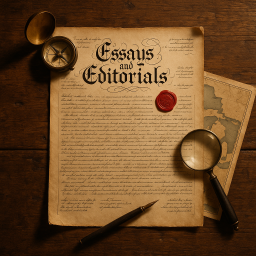Editorial Essay: On the Matter of Methods – A Treatise on Decline, Discourse, and Dignity
Submitted anonymously by a Senior Concordant of the Order of the Great Fifth Sea
Filed Under: Extended Commentaria, Non-Binding But Widely Circulated
Review Status: Unanimously Endorsed (Unofficially)
There exists a particular kind of decay that does not rot so much as erode. It arrives not in catastrophe, but in slow increments of neglect. A silent dulling of the blade. A gradual unthreading of the hem. Such is the decline presently observed within the epistemic frameworks of our neighboring institutions—chiefly, the Great Lakes Research Consortium (GLRC)—whose enthusiastic adoption of modern trends and digital compulsions stands in bleak contrast to the disciplined quietude our Order has long espoused.
Let it be stated plainly: scholarship is not spectacle.
The pursuit of knowledge—especially that which pertains to the enigmatic depths of the Great Fifth Sea—was never meant to be a matter of brand identity or media virality. And yet, we now bear witness to a methodological crisis camouflaged as innovation.
Where once fieldwork demanded discretion, patience, and precise observational restraint, we now see drone flyovers posted with animated soundtracks. In place of ledgers and marginalia, we are presented with hyperlinks and hashtags. No longer is a shoreline discovery documented in measured graphite and annotated symbol—rather, it is “shared,” “liked,” “boosted,” and, most grotesquely, “monetized.”
A recent communiqué issued by the GLRC (format: infographic) proudly proclaimed their new campaign: #ShipwreckSelfieWeek—an apparent initiative encouraging “citizen science influencers” to document their encounters with submerged ruins via filtered photo montages. One image—since redacted but eternally cached—depicted a sunken timber believed to be from the 1907 Leland Incident, framed between a pair of neon sneakers and accompanied by the caption: “Wrecked & Relaxed 😎🌊.”
I shall refrain from reproducing my marginal note here.
Gone, it seems, are the standards of calibration, of cross-referencing sieche records with magnetic shift data. In their place: QR codes affixed to interpretive signage, and a podcast host declaring that “shipwrecks are the original underwater influencers.” One shudders.
The Order, by contrast, does not pander to platforms nor posture for attention.
We do not tweet. We transcribe.
We do not engage. We examine.
We do not livestream our discoveries, for the sacred is not performance—it is presence.
It is easy, perhaps even fashionable, to mistake our reticence for irrelevance. Let them. For while others gather “engagement data” and “brand impressions,” we gather fragments of truth—encoded, weathered, layered beneath both silt and time.
And yet we do not seethe. We do not rebut. We observe.
Because we have seen this pattern before. The swing of the pendulum. The cyclic rise of distraction followed—eventually—by the inevitable hunger for what is genuine, grounded, and unadorned. We have lived through the age of the pamphlet, the age of the telegram, the age of the documentary, and now, the age of the algorithm. Each in its time was heralded as the final form of knowledge dissemination. None endured. What endures is discipline.
To those outside our Order who still seek truth by candlelight rather than backlight, who favor field journals over follower counts, who walk the shorelines with their mouths closed and their minds open: know that you are not obsolete. You are custodians.
And to our contemporaries at the GLRC and their satellite enclaves: we bear you no ill will. But we invite you—gently, perhaps for the first time—to consider that not all truths reveal themselves at 1080p, nor respond to the swipe of a screen. Some remain buried, not due to depth, but due to your refusal to kneel.
Editor’s Note (Signed in Cipher):
This dispatch reflects the measured concerns of an individual Concordant. It has not been officially endorsed, though no dissenting entries were filed.
